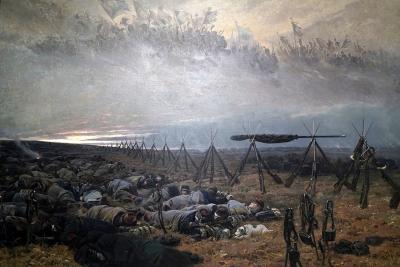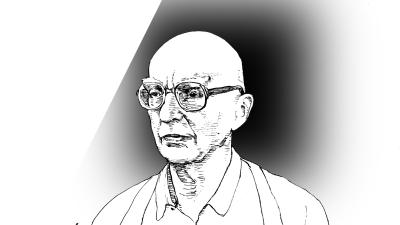Glaring from beneath his brows spoke to him swift-footed Achilles (…) how shall any man of the Achaeans obey your words with a ready heart
either to go on a journey or to fight against men with force?
It was not on account of the Trojan spearmen that I came here to fight,
since they have done no wrong to me. (…)
But you, shameless one, we followed, so that you might rejoice, seeking to win recompense for Menelaus and for yourself, dog-face, from the Trojans.
Homer, Iliad, Book 1, 155-166
* Homer. The Iliad, English translation by A.T. Murray, Cambridge, MA., Harvard University Press; London, William Heinemann, Ltd. 1924.
Shortly before his death, Stanislaw Lem said: “There is no such thing as a good war”[1]. After all, it does not follow from this that war is simply evil. It is too complicated a state of affairs for such a qualification. On the other hand, there is no doubt that its elements are physical evil and moral evil, as well as goodness. Let us begin with a definition to fix our attention on something tangible, bearing in mind that a definition alone does not determine anything. In order to explain the meaning of a concept, it must be anchored in theory, i.e. in a set of theses, in this case, about war. And such theses will be made here - illuminating the world for some, not others. It cannot be otherwise when one enters the ground of metaphysics. Moreover, only the philosophy of man, which is part of metaphysics, consisting of synthetic a priori judgements, has something relevant to say about war. These judgements are different in the right and in the left oriented. Logic allows us to see the asymmetry between these options, although it does not determine the choice of either of them.
Well, war is the (def.) armed settlement of a conflict between states.
Let us complete this immediately: civil war = the armed settlement of a conflict between communities (e.g. tribes or religions) within a single state.
1. The state character and tragedy of wars
There would be no wars if there were no states (with armies, weapons, treasure, palaces, and granaries). And indeed, there have not been for 95% of human history. Indeed, there is no evidence of wars in the Palaeolithic and Neolithic (there were conflicts between tribes and individual crimes, but no battles). Wars were only triggered by the birth of states 6000 years ago. Leszek Kołakowski is therefore not right when he writes (at the end of the 20th century) that “there have always been wars”; nor is he right when he says that “it is not certain that wars will never cease”, nor when he proclaims - that “tyranny breeds wars”[2]. The latter explains nothing; there are bloody collective conflicts without tyrants, such as the Israeli-Palestinian one.
It is difficult for us to talk about war today because there has been no war in Europe for almost 80 years (apart from Yugoslavia in the 1990s - a bloody but local civil war that failed to terrify Europeans). Three generations have not experienced it (we are talking about collective consciousness): mine, my students’, and their children’s. However, after 24 February 2022, it stood again at our gates and looked into our eyes. Terrified, we cannot naively maintain - I repeat - that it is fundamentally evil. Gravity is not evil either, although children fall out of windows. For that is the nature of the world. In any case, war is tragic, and it should be looked at not in a pacifist or militaristic way but in a metaphysical way. War is a manifestation of the tragedy of human plight. Namely, from one evil - the conflagration of war - we fall into another, social degeneration, i.e. the domination of smallness and the self-destruction of society from within. This happens cyclically, constituting a historical fatality.
It is possible to maximise the good of one group, and it is possible to maximise the good of the other group, but not always both at the same time. This must sometimes happen among the many human groups (as happened to the Greeks and the Trojans or the Ukrainians and Russians). At the same time, it is only the collision of two clusters that gives impetus to this maximisation; without it, the life instinct of the community dies out. One can say about the human world: that the quilt is too short, and only stretching it out guarantees warmth, i.e. collective survival. There is no escape from this state of affairs. Such is the world, hence the wars. States fight them in the name of nations. “The state is the fighting organisation of the nation”, Henryk Elzenberg[3] used to say. As long as there were no states, there were no wars. Nevertheless, is it possible today to imagine a world without states (Kolakowski’s suggestion)? One can - as a worldwide Gulag (again following Elzenberg).
2. “Just” wars
Wars can be divided into barbaric, civilised, and neo-barbaric wars. Civilisations civilised war; all the epics of antiquity - from which literary fiction begins - Gilgamesh, the Vedas, and the Iliad, are about this. A cult of heroism was adopted, and a rigorous war ethic prevailed - condemning murder, rape and looting of civilians. Of course, there were always invasions typical of the Huns or Tartars.
The “just war” was taught by St Thomas. (In opposition to it, the “cursed war” is distinguished by de Maistre[4]) . This, however, is nothing more than an apology for civilised war. In 1939, this medieval teaching was repeated in our country by the philosopher and soldier Fr J. M. Bocheński[5]. In his view, a just (just, holy, defensive - including preventive) war must fulfil three conditions: 1/ there must be a just cause behind it (objective harm to the nation); 2/ there must be a righteous intention; 3/ the authorities must have authority. In other words, to be in line with the duty we must fight, including killing, in the name of our due rights; have the good of the homeland in our conscience, not low motives; the authority is supposed to represent the nation. This is, after all, the justification of war always relativised to one side, to the perspective of one community. “The just cause”, on the other hand, occurs on both sides constantly: it is constituted by the natural expansion of each community - as far as possible to take away material goods from strangers and impose one’s spiritual goods. (Marx was wrong to claim - that it is only about the former. A war “in the name of ideas” is a war for a collective way of life or “spiritual interests”; ideas as thoughts are socially secondary). Wars, therefore, always have objective causes - usually, their “braid” (Lem) could be access to water, food, the defence of a minority, a threatened morality, and one’s position in the world. This can already be heard in the speech of Achilles (cf.: motto). A just cause can, however, be abandoned in the name of a more just cause.
Just like a coin - war has two sides: attacking and defending. Moreover, it can be a just war from both sides - like Napoleon’s France in its clash with Russia or the Greek city-states with each other. Also from the point of view of the Germans, the Third Reich was to fulfill conditions 1-3, but the course of the Second World War falsified assumptions 2. and 3.) The criminality of war lies not in the onslaught but its conduct. Because the power waging the war may not have a conscience and thus not represent the nation. I would call this type of war neo-barbarian or, more precisely, deceitful (because the former barbarian wars did not mask their nature). War of a new type emerged irrevocably in the twentieth century with technologies of mass destruction and, before that, with mass society. The very existence of such technologies (“A, B, C weapons”) already “justifies” the murder of civilians by traditional methods (as the supposedly lesser evil, bypassing the old principle of the “least evil” - i.e. killing only soldiers). Nuclear extortion “legitimises” the murder of populations on a smaller scale than the maximum possible. The second root of modern warfare is a peculiar type of leader born of a mass society (in which “masses” are detached from the nation). Well, a leader who does not stand eye to eye with the enemy on beaten ground - as Achilles stood with Hector - tends to push the “death button”. There used to be no such “button” (technology of mass destruction) and the leader had a conscience, which is why he remained a leader. Nowadays, we have numerous painted chiefs, madmen without a conscience - like Hitler, Stalin, and today Putin. The modern world has produced rulers and leaders of this kind. The only salvation for this, very flawed after all, is democracy - i.e. social control, not allowing the tyrant to take the helm. (Contrary to Kolakowski; however, the absence of tyrants does not mean the absence of wars).
On the other hand, imperialism is the empire’s tendency to expand. It cannot be condemned in general - there are empires, so there is imperialism. We condemn it at home because the Poles have never been imperial. However, the USA, Russia and China are undoubtedly empires; therefore, they practise imperialism. We know from history that empires always fall. The thing is which one falls first.
3. Independence from human will
Wars break out because it is not up to humans but the mechanism of the world (or God’s will as traditionally said). These are the elements, and they are beyond our control. The human population is – let us say - different trains running on different tracks. We are in a carriage of some kind, but we cannot decide how the train runs. With a tremendous collective effort, we can, at most, make the wagons switch to a different but ready-made track. Train collisions, in general, are beyond our control.
Wars must break out because humanity is divided into a multiplicity of antagonised communities - tribes, nations, and civilisations. Humanity is “diverse” (as Lem used to say), and such is the nature of the world. We condemn wars the same way we condemn diseases: they should not exist, but they do. Moreover, they will exist. In fact, we condemn the evil contained in them - moral and physical. War reveals or realises great evil, but it also brings good. This is what the “Divine dialectic” of the created world is all about. “The purpose of war is peace”, wrote Aristotle (Politics)[6]. It is, after all, a different peace from the one before the war - a better one. “To wish that there were no wars is to wish that man had nothing to value more than life” (Elzenberg)[7]. This cannot be done - for people have goals higher than life and willingly give their lives for them.
This is the case in every community, regardless of the cowards, slackers, opportunists, nihilists, i.e. rotters (Bocheński). The post-war peace, at least temporarily, relegates the latter to the background.
“War is thus divine in itself since it is a law of the world”, wrote Joseph de Maistre, “the wrath of heaven makes kings arm themselves[8]”. Half a century later, our Ludwig Gumplowicz (1838-1909) explained this on the ground of theory. [His doctrine is groupism - a pessimistic continuation of Aristotle’s Politics; his only philosophical work written in Polish is System of Sociology, 1887[9]; his principal work - only slightly earlier, with the infamous title - Der Rassenkampf. According to this theory, humanity is permanently divided into communities, and these clusters fight each other endlessly because 1/ it serves the survival of the species (the more “innovative”, the “better adapted” win); 2/ it serves the domination of the good over the bad, and thus the creation of culture. Another great Frenchman of the 19th century, besides de Maistre, Alexis de Tocqueville, wrote: “war has the effect of putting every man in his proper place”[10]. This is to be understood this way: without war, society degenerates or collapses; the commoners, the rotters, dominate it. Wars are terrible, but from the point of view of the Creator of the world - necessary. Furthermore, no modern quasi-substitutes of it, cyber-attacks, etc., can replace traditional war with weapons because these only work temporarily. The ultimately effective weapons are always only bombs.
4. The imperfection of human nature
Our imperfection, in general, consists in the fact that man is a herd-like but anarchic being - he is characterised by an “unsocial sociability” (Kant)[11]. Furthermore, man is a sinful being (this is a particular “imperfection” ): both bad and good people tend to be evil (the latter only have brakes). Only a community can bring order to individual anarchy and temper evil. Different communities do this in many ways, in their way, hence the communal antagonisms. Joseph de Maistre wrote, “if human justice had seized all criminals, there would have been no war at all”[12]. Yes, but only in the sense that there would be no communal antagonisms if there were no sinners. However, there would also be no communities or good; there would only be animal herds.
Well, pacifism is an attitude that grows out of false anthropology from an optimistic view of man. If the man is inherently good, it is enough to improve his living conditions - to make him desist from wars. To claim that this is possible is a utopia. A very harmful utopia - in the USSR, for example, Western pacifists were called “useful idiots” because this utopia paralyses the will to fight evil. It gives the field to evil. This is why Bocheński used to say (unkindly to many), in Christian terms: “The Lord God created the enemy so that we should beat him”[13]. Wars can only stop in a worldwide Gulag, then yes. So, either wars or the Gulag. This is indeed the meaning of Bertrand Russell’s slogan “better red than dead”. Red is the Gulag.
5. Views
My view of the future of humanity is pessimistic in the sense of Gumplowicz. However, I will express it again in the words of Stanisław Lem: I am an “optisemist” - I derive hope from a pessimistic view of the world.
There are more and less warlike nations. It depends on the national character (the main inclinations of a nation). In turn, it has been forged historically - on the basis, above all, of religion and the collective gene pool. For example, Ukrainians and Russians are brave, Arabs the most so; Chinese are industrious and persistent, Americans innovative and organised, and Poles battle-hardened but anarchistic. Of course, each nation has many inclinations which oscillate according to living conditions. The latter are the domain of Grace (or chance - as you prefer).
There are eight billion of us on Earth. That is a “miscellaneous” eight billion, so much blood will be shed, yes. The world of Islam is the most eager for this blood shedding today, and it is rightly feared. Nevertheless, something worse is looming on the horizon - a Gulag brought about by modern technology. The followers of Muhammad are not capable of this. But then there are the Chinese, who may not be particularly bloodthirsty, but are ruthless. Nor do they value freedom. This is what I fear most. Moreover, therein lies the unheard-of danger - that Russia will not permanently conspire with China. Russia must be dragged to the side of the West (after defeating it in the war with Ukraine, of course). I know how unbelievable it sounds today; the Russians would have to demolish Lupianka like the Bastille. However, I believe in Christian civilisation; it is the only ray of optimism. That is why wars also bring hope. Because when they cease entirely, “the world of tribes or herds will end, and the world of termite mound will begin” (these are some of the last words of Bogusław Wolniewicz). The queen will probably be Chinese, and we will become workers with strictly defined functions. Let us conclude in Roman terms: Si vis pacem, para bellum (“If you want peace, prepare for war”).
[1] S. Lem, 2006, web conference.
[2] L. Kołakowski, O przemocy, [in], Mini wykłady o maxi sprawach. Kraków 2009, p. 74-75.
[3] cf. H. Elzenberg, Naród i wojna, „Etyka”, t. 25/ 1990 (selection from manuscripts and edited by Z. Musiał), p. 73-74; cf. U. Schrade, Międzywojenna polska myśl narodowa. Kraków 2004, p. 46-71.
[4] J. de Maistre, Wieczory petersburskie, translated by M. Bucholc, Warszawa 2011, p. 254.
[5] cf. J. M. Bocheński, Założenia etyki wojskowej, [in], Katastrofa pacyfizmu. (Antyk) Lublin, Śląsk, Warszawa 1989, p. 13-21.
[6] Arystoteles, Polityka, ks. VII, 1334a, [in]: Dzieła wszystkie, t.6., Warszawa 2001, p. 207 (translated by L. Piotrowicz).
[7] H. Elzenberg, Naród i wojna, op. cit., s. 75.
[8] J. de Maistre, Wieczory petersburskie, op. cit., p. 253 (cf. the entire Rozmowa siódma).
[9] cf. L. Gumplowicz, System socjologii. Warszawa 2013 (cf. especially from Book III – Żywioły społeczne i związki ich ustrojowe, from p. 217 to 388.
[10] A. de Tocqueville, O demokracji w Ameryce, translated by M. Król. Warszawa 1976, p. 443.
[11] cf. I. Kant, Rozprawy z filozofii historii, translated by T. Kupś et alia. Kęty 2005, p. 34.
[12] cf. J. de Maistre, op. cit., p. 251.
[13] J. M. Bocheński, Wspomnienia. Komorów 2008 (1994), p. 19; also 247.












Comments (0)